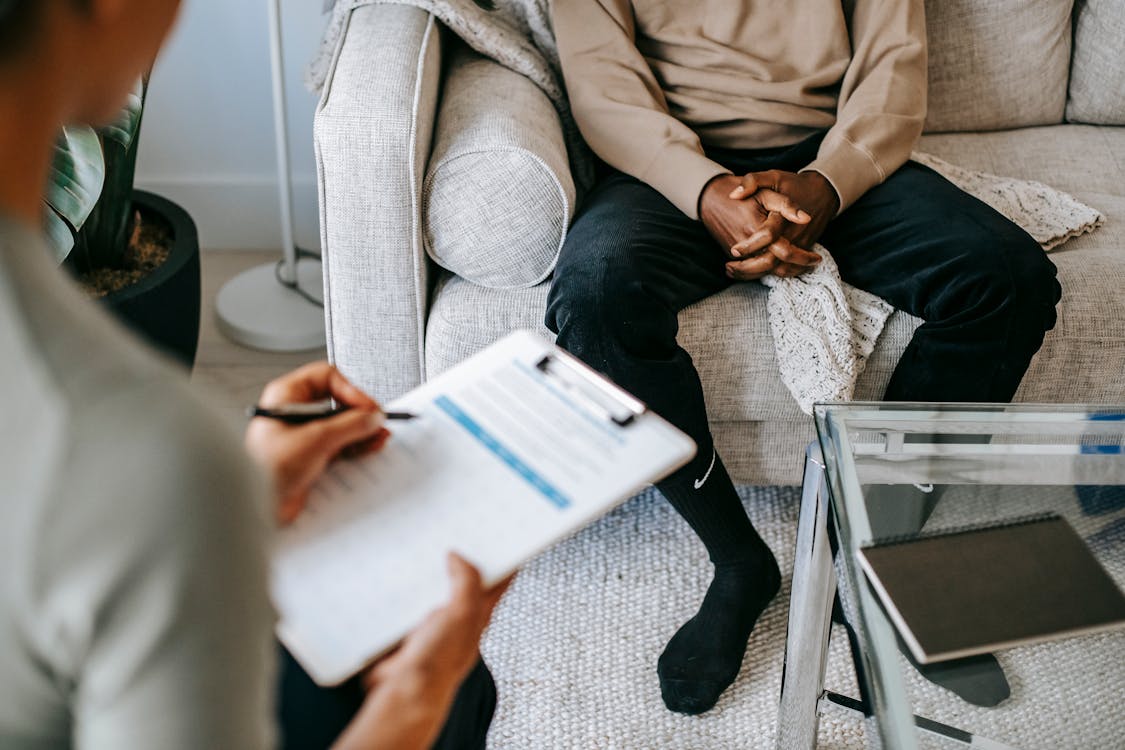When you start to see a therapist it can be daunting for many reasons. You’re stepping outside your comfort zone, meeting someone new and divulging your struggles in the hopes that you can find peace. Some may find the right match right away, while others may have to try several therapists before they find someone that they’re comfortable with. But no matter how different our journey into therapy is, some things remain the same.
Vanessa McLennan kindly provided this article detailing what you can expect when you see a therapist for your eating disorder. It’s a pleasure to have someone with such knowledge about binge eating and emotional eating on the blog, two topics we rarely touch on. I’ve spent some time going through Vanessa’s website, specifically the blog section, and have learned so much about the other side of the eating disorder spectrum.
About the author.

Vanessa McLennan is a Binge Eating, emotional eating, food addiction, eating problems, and weight loss specialist. She’s a hypno-psychotherapist, and qualified in counselling, EFT, EMDR, CBT, and naturopathy. She has an interest in health and was brought to this area by her own health issues. She loves helping people heal their trauma and childhood so people become relaxed and happy with their eating and food.
You can find out more about Vanessa McLennan on her website. And be sure to check out the blog section where there are multiple articles to help you better understand binge eating, emotional eating, and food addiction.
Five things to expect when you see a therapist for your eating disorder.
As a therapist, I can appreciate that coming into my office to talk about your eating disorder can be a huge challenge. There are so many things going through your mind. You no doubt have fears, worries, and questions.
Dealing with an eating disorder early can speed up your recovery so you’re not suffering longer than you have to. Getting help is such a positive step, even though it can be daunting.
Understanding what will happen and the therapist’s role is a big help in making the journey to recovery a successful and enjoyable one for you. This is forming a positive relationship with yourself and food. The relationship you develop with your therapist is a major part of the therapy, so taking the time to find the right person for you is essential.
But once you’ve found one, what can you expect when you see a therapist?
Your first meeting.
The first meeting is really to establish what your eating pattern is and what is going on for you. I would not only be asking questions about your eating but also how you feel about your eating and yourself. It is also your opportunity to ask me lots of questions and to get a feel for, can you work with me. It is not going to work if you don’t like or get a bad feeling about your therapist.
It’s the therapist’s role to provide a safe environment where you feel you can trust them and say whatever is on your mind and be received with empathy and compassion.
From this session, you should have a plan of how the therapy will go and what you will work on. You may even put in a review date. It is difficult to know how many therapy sessions you will need as each person is different.
Have a look at this post on starting therapy by Pantea Rahimian.
Finding the root cause.
Some therapies will focus on the presenting behaviours. Others will want to find the root cause. There are many types of talking therapies. When I see clients for Binge Eating and Bulimia issues, I know it’s not actually about the food. Usually, through discussion, a person’s past will come up. It becomes evident that past events would benefit from being discussed and the emotions around them being worked through. It does not mean you have to relive the past, just work through issues so they are no longer triggering for you. These past issues are many times a cause of your eating disorder and working through them helps to resolve your present-day eating issues.

Understanding your eating behaviours.
Therapy also involves helping you to find healthier and new ways of eating. It is far from telling you what you should be eating, or how often. When I see people with binge eating or food addiction we work through what triggers them into a binge. We work out why that is a trigger and then work out other ways to respond to that trigger so that it no longer results in a binge.
How the therapist supports you.
The therapist is there to support you. With person-centred therapy, the therapist’s role is to give you unconditional positive regard, empathy and congruence. In other words, they will listen and understand you. They will point out the positives and provide warmth and kindness to you. They will also be honest and reflect back to you what they see and hear. This all helps you to see how your eating disorder is not your fault. It helps you to recognise the behaviours that you are trapped in and cannot see. It helps you to find the positives within yourself so you can resolve your eating problems.
It is worth knowing that each therapy session is individual to you.
Ongoing support.
As you go through therapy and your eating issues start to resolve, you may need support rather than working on past trauma. When I help people with BED we work on becoming body positive. We learn to start being kind and loving to ourselves. I also help someone with how they can support themselves. No one wants to be in therapy for the rest of their lives, so it is important to support them in becoming autonomous. This gives the person much-wanted freedom and control over their own food choices.
Many people who have gone through therapy, find a new sense of freedom. They enjoy food and a new relationship with it. They find that they are kinder to themselves and no longer harsh and judgemental. They become relaxed around food. They no longer have a sense of lack of control. This is when life becomes filled with more light and fun.
Have you been to see a therapist for your disordered eating?
Would you like to share your experience below? Did you find it helpful or the opposite? It personally took me a long time to find a therapist that fit my personality and recovery style. But once I found them, my eyes were well and truly opened up!


Thanks for the helpful tips on what to expect in eating disorder therapy. Building a trusting relationship with your therapist and being patient with progress are key takeaways. Seeking help for mental health is important, and this article can encourage others to prioritize their well-being.
This is such a great and insightful post. I learned a lot about eating disorders and what to expect from this. Thanks for bringing awareness to this issue!
This is interesting, we need t find the root cause for it. I don’t have this but its good to know about it. Thank you for sharing!
This is so helpful! I have seen therapists off and on for similar reasons.
I’m going to share this with someone I know who is contemplating going to therapy as it will definitely help. It can be quite intimidating or anxiety filled when first going especially if you don’t know what to expect — great post!
this is a very informative post, I will soon be having an appointment, and this post is enlightening and will help me to ask the right questions.
Though by God’s grace I never been to this eating disorder but the post is quite helpful and informative too. All the points are valid when you go through any problems like this. As you mentioned knowing the root cause is the most important thing in solving any problem.
This was very helpful to people, thank you so much for taking the time to write about this!
Aaahhhh….you are so right! I am so recommending this advisory to my friends.
This made for an interesting read. I think most of us have something we’d benefit from seeing a therapist for in this day and age. It is good that they can help with so many conditions. Knowing about our eating behaviours and triggers can really help us address problems. It can be hard to change our mindset but once we learn to love ourselves it can help.
I appreciate your thoughtful post on what to expect when you see a therapist, especially around the topic of disordered eating. I’m a licensed mental health provider myself and know therapy is a powerful tool to help us with our mental health and well-being. I put together an article on how to start therapy the right way including the process of actually finding a good therapist, which is a great compliment to your post
I haven’t been to a therapist for my eating disorder but I bet it would help me a lot when I try. Thank you for the post, At least I have an idea on what to expect.
Your points are good and helpful. I never had a good experience with therapist and it affected me negatively. But yeah the support part caught my eye and I guess I’ll opt for another therapist soon.
Powerful post. This is absolutely essential to anyone seeking treatment for an eating disorder. Great information on what to expect and the first steps.
I’m thankful I don’t have an eating disorder. However, I do know some people who do and think this post is a helpful introduction.
This is a great overview of what can be expected when someone begins therapy for an eating disorder. I completely agree with the idea that it’s important to find the right therapist and create a safe, trusting environment which will allow you to work through any anxieties and worries around your eating disorder. It’s also so important to understand the root cause of your condition in order to achieve full recovery using therapeutic support. Seeing a mental health professional can be incredibly valuable and I’m glad you’re encouraging people to take action and make that first step towards full recovery.
This will be so helpful for other people who have an eating disorder and considering therapy. Thank you for sharing.
Lauren
Thank you for such an insightful post, this post will help so many people. The first therapy session is never easy. When I had mine (not for ED), it was incredibly daunting but it felt like such a weight had been lifted from my shoulders afterwards x
Lucy | http://www.lucymary.co.uk
This is a very interesting post. During lockdown I thought I needed to talk to someone but I was not sure if I was sad or depressed. My hesitancy has kept me away from visiting a therapist. but this post definitely helps in showing the positive side of therapy. Thanks Nyxie.
Great post – this will be so helpful for so many people. Seeing a therapist is no easy decision and can be SO daunting. Although it wasn’t for an ED, I remember my first therapy session with a private counsellor and I have never been more nervous in my life, I remember it so clearly! But I came out of that session feeling better and more seen that I had done in years.